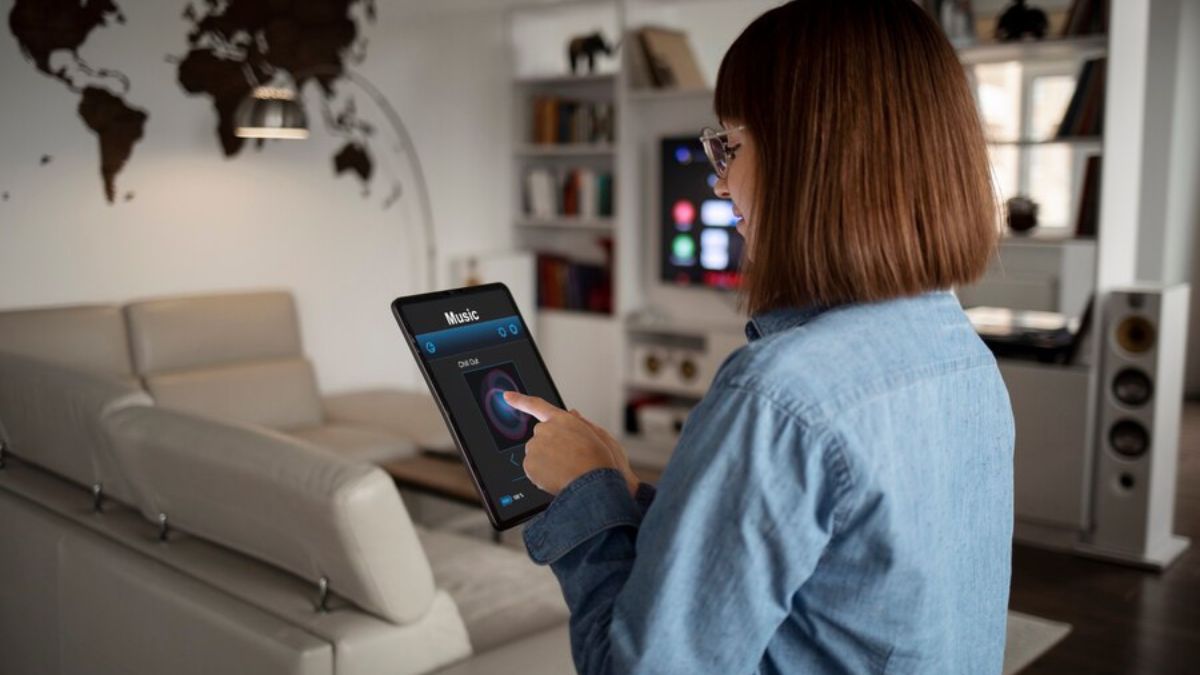TECHNOLOGY
How Smart Home Technology is Revolutionizing Security

Introduction to Smart Home Technology
Welcome to a transformative era where homes are not only smart but also secure in unprecedented ways. The modern revolution of home security systems for your home is reshaping how we approach the concept of safety and convenience within our living spaces. Leveraging the latest technological advancements, these systems offer a harmonious blend of surveillance, automation, and control, transforming our homes into fortresses of comfort and security.
The essence of smart home technology lies in its ability to interconnect various devices, providing homeowners with comprehensive oversight over their environment. This integration means that homeowners are no longer restricted by location when managing their home’s security. Whether basking in the sun miles away or simply relaxing at home, real-time control is at your fingertips, ensuring peace of mind through unparalleled connectivity and functionality.
Key Advantages of Smart Home Security
The appeal of smart home security systems goes beyond their sleek technology. As highlighted by BBC News, the rising adoption of these devices is driven by their ability to provide homeowners with a detailed, on-demand overview of their property’s security state. These systems empower homeowners by offering insights and allowing them to manage safety easily.
A significant advantage is the provision of real-time notifications. This feature ensures you are aware of any unusual activities or security breaches as they occur, allowing swift action to prevent potential threats. Moreover, when integrated with other smart home devices, these systems can automate responses, such as activating lights upon motion detection, enhancing security and deterrent capability. This holistic approach not only thwarts potential intrusions but also supports the home’s overall functionality and energy efficiency.
Essential Components of a Smart Home Security System
- Smart Cameras: These act as the eyes of the security setup, offering unparalleled visibility with high-definition video, night vision, and motion-triggered capture. With two-way audio communication, homeowners can interact with individuals at their property, adding an active layer of defense.
- Motion Sensors: A key element in detecting unusual movement, these sensors provide alerts and can trigger automated responses, such as activating alarms or cameras, providing an immediate assessment of any potential threat.
- Smart Locks: These devices enhance security by offering keyless entry and robust management capabilities, allowing owners to secure entry points remotely and efficiently manage access, even when away from home.
- Alarm Systems: Sophisticated alarm systems do more than sound an alert. They can connect directly to security monitoring services or local authorities, ensuring rapid response to security concerns and reducing the risk of successful break-ins or unauthorized access.
Affordability and Cost Considerations
While it’s easy to perceive smart home security systems as a luxury, they are increasingly accessible and cost-effective, especially considering long-term benefits such as reduced insurance costs. Many insurance providers offer discounts for homes equipped with advanced security systems, recognizing the decreased risk they present. Tax incentives in various regions further support the financial viability of these systems.
These systems are designed to be modular, enabling homeowners to tailor their security setup to fit budget constraints. Starting with essential components and expanding over time ensures that investing in security doesn’t have to be a financial burden. Additionally, by enhancing energy management and reducing incidences of theft or damage, smart security systems contribute to overall savings, amplifying their value as a prudent investment in household security and operational efficiency.
Addressing Privacy Concerns
Despite their advantages, smart home systems raise valid privacy and data protection concerns. In an increasingly connected world, safeguarding personal data and preventing unauthorized access is paramount. According to CNET, it is essential to adopt rigorous security practices to minimize risks and protect valuable personal information while enjoying the benefits of smart technology.
To address these concerns, homeowners should implement strong, unique passwords for all devices, change them regularly, and enable two-factor authentication as a standard practice. Additionally, securing home networks with the latest encryption protocols is crucial. These measures ensure that the sophistication of smart home technology doesn’t come at the expense of your privacy and that your digital and physical realms remain secure.
The Future of Home Security Technology
The horizon of home security technology is promising, driven by rapid advancements in artificial intelligence and machine learning. These technologies are redefining the security landscape, allowing for predictive analytics and pre-emptive threat detection, significantly enhancing security measures and response times.
Emerging innovations, such as voice recognition systems and autonomous drones, are poised to offer even more dynamic and flexible security solutions. These technologies will facilitate greater personalization and control, ensuring that each home’s security requirements are precisely and easily, bridging the gap between cutting-edge technology and practical, everyday application.
Tips for Maximizing Home Security
- Regular Updates: Keep device software updated to protect against new vulnerabilities. Regular updates enhance system reliability and security, safeguarding your smart devices against potential threats.
- Complex Passwords: Adopt unique passwords for each device, changing them periodically to maintain a high defense level against unauthorized access.
- System Checks: Conduct routine maintenance and testing of all components to ensure everything functions correctly, minimizing potential security gaps.
Professional Installation: For complex setups, consider hiring professionals to ensure that every aspect of the system is optimally installed and configured, leaving no room for security breaches.
TECHNOLOGY
The Impact of Alaya AI on Business Efficiency and Productivity

Introduction to Alaya AI
In today’s fast-paced business landscape, staying ahead of the competition is crucial. Enter Alaya AI, a transformative technology that’s changing the way companies operate. Imagine having an intelligent system that streamlines processes, increases productivity, and enhances decision-making—all at once.
This innovative artificial intelligence solution is designed to understand your unique business needs and adapt accordingly. As organizations harness the power of Alaya AI, they find new opportunities for growth and efficiency like never before.
Join us as we explore how Alaya AI is revolutionizing business operations across various industries. From real-world case studies to insights on its advantages and potential challenges, discover why this cutting-edge tool might just be the key to unlocking your company’s full potential in today’s digital age.
How Alaya AI is revolutionizing business operations
Alaya AI is transforming the way businesses operate by streamlining processes and enhancing decision-making. By leveraging advanced algorithms, it analyzes vast amounts of data in real-time. This allows companies to make informed choices quickly.
Automation plays a crucial role here. Routine tasks that once consumed hours can now be completed in minutes. Employees are freed from mundane duties, allowing them to focus on strategic initiatives.
Moreover, Alaya AI offers predictive analytics that identifies trends before they become apparent. Businesses can anticipate market shifts and adapt accordingly.
Collaboration becomes more efficient as well. Teams access shared insights easily, fostering innovation and creativity among members.
With its user-friendly interface, businesses of all sizes can integrate Alaya AI seamlessly into their operations without extensive training or resources needed for implementation. The result? Enhanced agility and responsiveness in an ever-changing market landscape.
Case studies of businesses that have implemented Alaya AI
Several businesses have harnessed the power of Alaya AI, reaping significant benefits in efficiency and productivity. For instance, a leading e-commerce company integrated Alaya AI into its customer service operations. This resulted in faster response times and improved customer satisfaction.
Another case worth noting involves a manufacturing firm that adopted Alaya AI for inventory management. By utilizing predictive analytics, they optimized stock levels and reduced waste significantly.
In the financial sector, a regional bank utilized Alaya AI to enhance fraud detection mechanisms. The system effectively flagged suspicious transactions with remarkable accuracy, minimizing losses while maintaining trust among clients.
These examples showcase how diverse industries are leveraging Alaya AI to streamline processes and drive growth. Each success story highlights specific applications tailored to unique operational challenges—demonstrating adaptability across various business models.
Advantages of using Alaya AI for business efficiency and productivity
Alaya AI brings a multitude of advantages that can significantly enhance business efficiency and productivity.
One major benefit is its ability to streamline processes. By automating routine tasks, Alaya AI frees up valuable time for employees to focus on higher-level work. This shift not only increases output but also fosters creativity.
Moreover, the data analysis capabilities of Alaya AI are impressive. It helps businesses make informed decisions by providing insights based on real-time data trends. Companies can quickly adapt strategies, boosting responsiveness in fast-paced markets.
Collaboration improves as well with Alaya AI’s tools designed for seamless communication among teams. Enhanced teamwork leads to more innovative solutions and better project outcomes.
Cost reduction is another significant advantage. Automating various functions minimizes operational expenses while maximizing profitability over time, creating a win-win scenario for organizations aiming for growth without increasing their budget.
Potential challenges and solutions for implementing Alaya AI
Implementing Alaya AI can present several challenges for businesses. One significant hurdle is the integration with existing systems and workflows. Companies may struggle to adapt their processes, leading to disruption.
Data privacy concerns also arise as organizations leverage AI technology. Ensuring compliance with regulations while protecting sensitive information is crucial.
Another challenge lies in employee resistance to change. Staff may fear that automation will replace jobs or complicate their roles. Addressing these fears through training and open communication can help ease transitions.
To combat these issues, companies should develop a clear implementation strategy. Investing in proper training programs fosters confidence among employees.
Additionally, creating a feedback loop allows ongoing adjustments based on user experiences. This adaptability enhances overall satisfaction with the Alaya AI system and promotes effective utilization across teams.
Future predictions for the use of Alaya AI in businesses
The future of Alaya AI in businesses looks incredibly promising. As technology continues to evolve, we can expect even more sophisticated applications designed to enhance decision-making processes.
Businesses will likely adopt Alaya AI for real-time data analysis, enabling them to make informed choices almost instantaneously. This could streamline workflows and improve customer interactions significantly.
Moreover, advancements in natural language processing may allow Alaya AI to better understand human emotions and sentiments. This capability could transform how companies approach customer service and marketing strategies.
In the realm of automation, expect increased efficiency across various sectors. Routine tasks might be handled seamlessly by Alaya AI, freeing up employees to focus on creative problem-solving.
As more businesses embrace this technology, collaboration between humans and AI is expected to flourish. The synergy created may lead organizations toward unprecedented levels of productivity.
Conclusion: Embracing the power of Alaya AI for success in the modern business world
As businesses continue to navigate an increasingly competitive landscape, the integration of Alaya AI stands out as a transformative opportunity. By harnessing its capabilities, organizations can streamline operations and significantly boost productivity.
Embracing Alaya AI is not just about leveraging technology; it’s about fostering innovation and enhancing decision-making processes. The data-driven insights provided by this powerful tool empower teams to focus on strategic initiatives rather than mundane tasks.
Moreover, as companies adapt to the challenges that come with implementing such advanced solutions, proactive strategies can be developed to mitigate potential hurdles. Continuous learning and adaptation will ensure that businesses remain at the forefront of their industries.
The future holds immense possibilities for those willing to embrace Alaya AI. With ongoing advancements in artificial intelligence, we are likely to see even greater efficiencies realized across various sectors.
For businesses aiming for growth and success in today’s fast-paced world, integrating Alaya AI is no longer optional; it’s essential for thriving amidst change. Embracing this technology could very well define tomorrow’s leaders in business efficiency and productivity.
-

 TECHNOLOGY1 year ago
TECHNOLOGY1 year agoTop 5 Tips for Mastering in_a_dndmixin_drag in Your Campaigns
-

 TOPIC1 year ago
TOPIC1 year agoExploring the History and Culture of Rosewellsk
-

 TECHNOLOGY1 year ago
TECHNOLOGY1 year agoYMoviesHD vs Other Streaming Platforms: A Comprehensive Comparison
-

 TOPIC1 year ago
TOPIC1 year agoBehind the Scenes: The Philosophy and Vision of PhmHaven
-

 TOPIC1 year ago
TOPIC1 year agoThe Rise of Tribute Printed Pics: Honoring Life Through Photography
-

 TOPIC1 year ago
TOPIC1 year agoA Beginner’s Journey with Lwedninja: From Novice to Pro
-

 TOPIC1 year ago
TOPIC1 year agoIs Finizona Free? Unpacking the Costs Behind This Popular Platform
-

 TOPIC1 year ago
TOPIC1 year agoDecoding m0therearf: Why This Buzzword Matters in Today’s Culture
